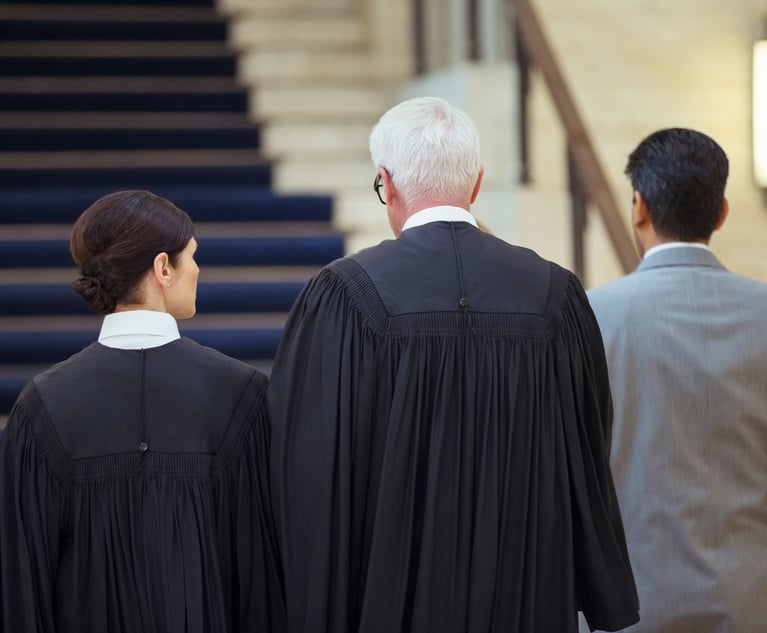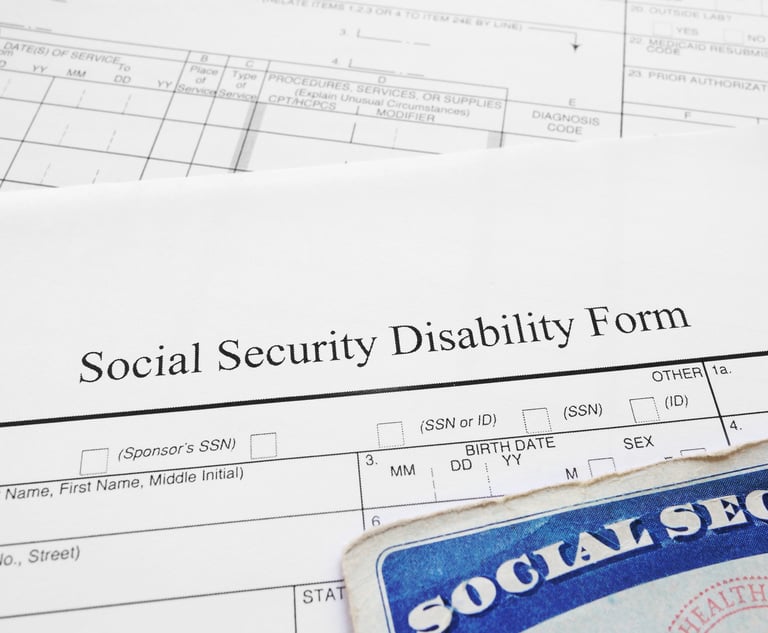Judicial Ethics Opinion 20-36
A judge need not disqualify him/herself from issuing a decision in a small claims matter because his/her relative applied for employment with the law firm that appeared at the hearing.
July 31, 2020 at 09:48 AM
3 minute read
The Advisory Committee on Judicial Ethics responds to written inquiries from New York state's approximately 3,600 judges and justices, as well as hundreds of judicial hearing officers, support magistrates, court attorney-referees, and judicial candidates (both judges and non-judges seeking election to judicial office). The committee interprets the Rules Governing Judicial Conduct (22 NYCRR Part 100) and, to the extent applicable, the Code of Judicial Conduct. The committee consists of 27 current and retired judges, and is co-chaired by former associate justice George D. Marlow of the Appellate Division and the Honorable Margaret Walsh, a justice of the Supreme Court.
Digest: A judge need not disqualify him/herself from issuing a decision in a small claims matter merely because his/her first-degree relative, a non-lawyer, independently applied for employment with the sole law firm that appeared at the small claims hearing.
Rules: 22 NYCRR 100.2; 100.2(A); 100.3(E)(1); 100.3(E)(1)(a)-(f); Opinions 17-74; 15-05; 14-155; 05-35/10-74; 99-87; 98-26; People v. Moreno, 70 NY2d 403 (1987).
Opinion: A judge completed a small claims hearing in which only one party retained counsel. Coincidentally, after the hearing, the judge's first-degree relative, a non-lawyer, applied for employment with that law firm as a paralegal. [1] Both the relative's job application and the decision are still pending. The judge asks if he/she must disclose or disqualify him/herself from the matter.
A judge must always avoid even the appearance of impropriety (see 22 NYCRR 100.2) and must always act to promote public confidence in the judiciary's integrity and impartiality (see 22 NYCRR 100.2[A]). Thus, a judge must disqualify him/herself in any proceeding where the judge's impartiality "might reasonably be questioned" (22 NYCRR 100.3[E][1]).
When a judge applies for post-judicial employment with a law firm, he/she must disqualify him/herself in matters involving the law firm while the application is pending (see Opinion 05-35/10-74). The present scenario, however, does not raise the same concerns. While a judge's own pending employment application raises reasonable questions about his/her impartiality in matters where the prospective employer appears, we believe a first-degree relative's pending employment application does not, without more, create any objectively reasonable basis to question the judge's impartiality or otherwise create any appearance of impropriety. Nor does the inquiry reveal any basis for mandatory disqualification (see Judiciary Law § 14; 22 NYCRR 100.3[E][1][a]-[f]). Thus, the judge "is the sole arbiter of recusal," and this "discretionary decision is within the personal conscience of the court" (People v. Moreno, 70 NY2d 403, 405 [1987]).
If the judge concludes he/she cannot remain fair and impartial, the judge must disqualify him/herself (see Opinion 98-26). Conversely, if the judge decides he/she can be fair and impartial and can decide the matter solely on the admissible evidence proffered at the hearing, the judge may preside. The judge need not disclose the circumstance, but may do so in his/her sole discretion as a prophylactic measure, even when one of the parties is appearing without counsel (see Opinions 17-74; 15-05).
If the law firm ultimately hires the judge's first-degree relative as a paralegal, the judge is disqualified in matters involving that law firm, although the disqualification may be subject to remittal in appropriate circumstances (see e.g. Opinions 14-155; 99-87).
[1] Relatives within the first degree of relationship include a parent or child of the judge or his/her spouse, or the spouse of such person.
This content has been archived. It is available through our partners, LexisNexis® and Bloomberg Law.
To view this content, please continue to their sites.
Not a Lexis Subscriber?
Subscribe Now
Not a Bloomberg Law Subscriber?
Subscribe Now
NOT FOR REPRINT
© 2024 ALM Global, LLC, All Rights Reserved. Request academic re-use from www.copyright.com. All other uses, submit a request to [email protected]. For more information visit Asset & Logo Licensing.
You Might Like
View AllTrending Stories
- 1Call for Nominations: Elite Trial Lawyers 2025
- 2Senate Judiciary Dems Release Report on Supreme Court Ethics
- 3Senate Confirms Last 2 of Biden's California Judicial Nominees
- 4Morrison & Foerster Doles Out Year-End and Special Bonuses, Raises Base Compensation for Associates
- 5Tom Girardi to Surrender to Federal Authorities on Jan. 7
Who Got The Work
Michael G. Bongiorno, Andrew Scott Dulberg and Elizabeth E. Driscoll from Wilmer Cutler Pickering Hale and Dorr have stepped in to represent Symbotic Inc., an A.I.-enabled technology platform that focuses on increasing supply chain efficiency, and other defendants in a pending shareholder derivative lawsuit. The case, filed Oct. 2 in Massachusetts District Court by the Brown Law Firm on behalf of Stephen Austen, accuses certain officers and directors of misleading investors in regard to Symbotic's potential for margin growth by failing to disclose that the company was not equipped to timely deploy its systems or manage expenses through project delays. The case, assigned to U.S. District Judge Nathaniel M. Gorton, is 1:24-cv-12522, Austen v. Cohen et al.
Who Got The Work
Edmund Polubinski and Marie Killmond of Davis Polk & Wardwell have entered appearances for data platform software development company MongoDB and other defendants in a pending shareholder derivative lawsuit. The action, filed Oct. 7 in New York Southern District Court by the Brown Law Firm, accuses the company's directors and/or officers of falsely expressing confidence in the company’s restructuring of its sales incentive plan and downplaying the severity of decreases in its upfront commitments. The case is 1:24-cv-07594, Roy v. Ittycheria et al.
Who Got The Work
Amy O. Bruchs and Kurt F. Ellison of Michael Best & Friedrich have entered appearances for Epic Systems Corp. in a pending employment discrimination lawsuit. The suit was filed Sept. 7 in Wisconsin Western District Court by Levine Eisberner LLC and Siri & Glimstad on behalf of a project manager who claims that he was wrongfully terminated after applying for a religious exemption to the defendant's COVID-19 vaccine mandate. The case, assigned to U.S. Magistrate Judge Anita Marie Boor, is 3:24-cv-00630, Secker, Nathan v. Epic Systems Corporation.
Who Got The Work
David X. Sullivan, Thomas J. Finn and Gregory A. Hall from McCarter & English have entered appearances for Sunrun Installation Services in a pending civil rights lawsuit. The complaint was filed Sept. 4 in Connecticut District Court by attorney Robert M. Berke on behalf of former employee George Edward Steins, who was arrested and charged with employing an unregistered home improvement salesperson. The complaint alleges that had Sunrun informed the Connecticut Department of Consumer Protection that the plaintiff's employment had ended in 2017 and that he no longer held Sunrun's home improvement contractor license, he would not have been hit with charges, which were dismissed in May 2024. The case, assigned to U.S. District Judge Jeffrey A. Meyer, is 3:24-cv-01423, Steins v. Sunrun, Inc. et al.
Who Got The Work
Greenberg Traurig shareholder Joshua L. Raskin has entered an appearance for boohoo.com UK Ltd. in a pending patent infringement lawsuit. The suit, filed Sept. 3 in Texas Eastern District Court by Rozier Hardt McDonough on behalf of Alto Dynamics, asserts five patents related to an online shopping platform. The case, assigned to U.S. District Judge Rodney Gilstrap, is 2:24-cv-00719, Alto Dynamics, LLC v. boohoo.com UK Limited.
Featured Firms
Law Offices of Gary Martin Hays & Associates, P.C.
(470) 294-1674
Law Offices of Mark E. Salomone
(857) 444-6468
Smith & Hassler
(713) 739-1250










